Related Research Articles

Civilisation—in full, Civilisation: A Personal View by Kenneth Clark—is a 1969 British television documentary series written and presented by the art historian Kenneth Clark.

Reginald Tate was an English actor, veteran of many roles on stage, in films and on television. He is remembered best as the first actor to play the television science-fiction character Professor Bernard Quatermass, in the 1953 BBC Television serial The Quatermass Experiment.
Telecrime was a British drama series that aired on the BBC Television Service from 1938 to 1939 and in 1946. One of the first multi-episode drama series ever made, it is also one of the first television dramas written especially for television not adapted from theatre or radio. Having first aired for five episodes from 1938 to 1939, Telecrime returned in 1946, following the resumption of television after the Second World War, and aired as Telecrimes.
For the Children was the umbrella title given to British television programmes and sequences targeted at children of school age, in the early years of the BBC Television Service. The title was first used in 1937 at 3pm as the opening programme for afternoon viewing. Suspended in 1939 along with the rest of BBC Television for the duration of World War II, it returned on 9 June 1946, running on Sunday afternoons and expanded to twenty minutes in length.

The Adventures of Sir Lancelot is a British television series first broadcast in 1956, produced by Sapphire Films for ITC Entertainment and screened on the ITV network. The series starred William Russell as the eponymous Sir Lancelot, a Knight of the Round Table in the time of King Arthur at Camelot.
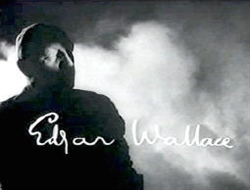
The Edgar Wallace Mysteries is a British second-feature film series mainly produced at Merton Park Studios for Anglo-Amalgamated. There were 48 films in the series, which were released between 1960 and 1965. The series was screened as The Edgar Wallace Mystery Theatre on television in the United States.
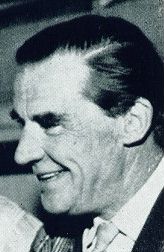
Edward George More O'Ferrall was a pioneering British film and television producer and director, as well as an actor.
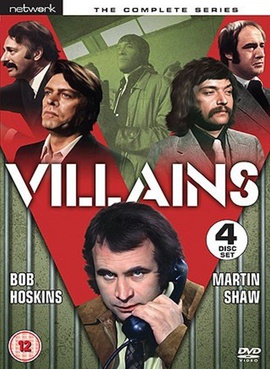
Villains is a crime drama series, shown in the UK in 1972, following the linked fates of nine bank robbers, led by George. It begins with the nine men meeting in prison during their appeal and traces each individual after the group escape from custody. The series also starred William Marlowe, Bob Hoskins and Martin Shaw.
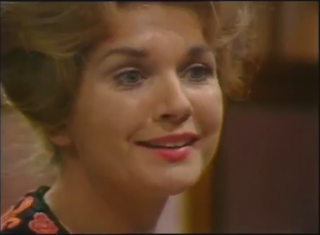
Angela Browne was a British actress. She had a recurring role in the early 1960s crime series Ghost Squad. She also appeared in episodes of shows such as Danger Man, No Hiding Place, The Saint, The Avengers, The Prisoner, Upstairs, Downstairs and Minder. In 1966 she appeared in the Norman Wisdom comedy film Press for Time.
Isabel Ruth Trouncer is a British stage, film and television actress. During the late 1950s she had a recurring role on the television series The Larkins.
David John Wordsworth is a former Australian politician who was a Liberal Party member of the Western Australian Legislative Council from 1971 to 1993. He served as a minister in the government of Sir Charles Court.
24-Hour Call was a 1963 British television series for ATV around the private practice of four doctors played by Godfrey Quigley as Dr Bennett and Geoffrey Frederick from a previous ATV series Call Oxbridge 2000, and newcomers Scott Forbes and Andrew Downie.
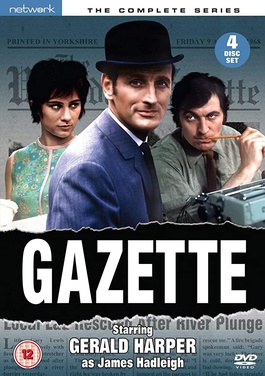
Gazette is a British television series which first aired on ITV in 1968. It starred Gerald Harper as James Hadleigh, a millionaire who relocates from London to Yorkshire and buys a local newspaper founded by his father many years before. The cast also included Jon Laurimore, Ralph Michael and Gillian Wray. Harper had just come off his starring role in the BBC series Adam Adamant Lives.
Neil Stacy is a British actor particularly known for his role in the 1980s television series Duty Free.
The Stanley Baxter Series is a British comedy television show which was originally broadcast on the ITV in 1981. It was Baxter's first weekly sketch show for nine years since the first series of his The Stanley Baxter Picture Show, as he had concentrated on producing one-off specials since then. Baxter was nominated for the British Academy Television Award for Best Entertainment Performance losing out to Nigel Hawthorne for Yes Minister.
Hancock is a British comedy television series which aired on ITV in 1963. It starred Tony Hancock as a pompous, self-regarding figure similar to the character he had played on Hancock's Half Hour for the BBC.
The Sullavan Brothers is a British television drama series which originally aired on ITV between 1964 and 1965, in 26 episodes.
Deadline Midnight is a British television series which originally aired on ITV between 1960 and 1961. It focuses on the employees of a London daily newspaper.
Relative Strangers is a British comedy television series which originally aired on Channel 4 between 14 January 1985 and 9 March 1987.

Give Us a Break is a British comedy drama television series which was originally broadcast on BBC One in a series of seven episodes between 22 September an 3 November 1983 with a feature-length Christmas Special the following year.
References
- ↑ Vahimagi p.301